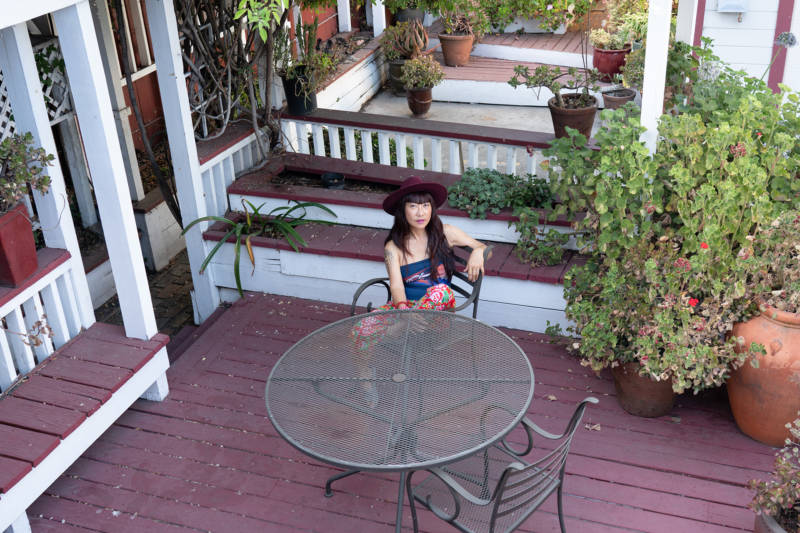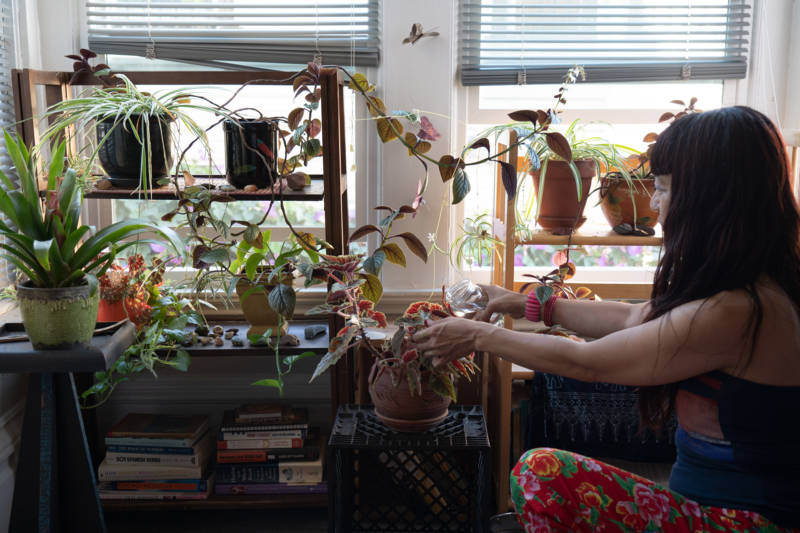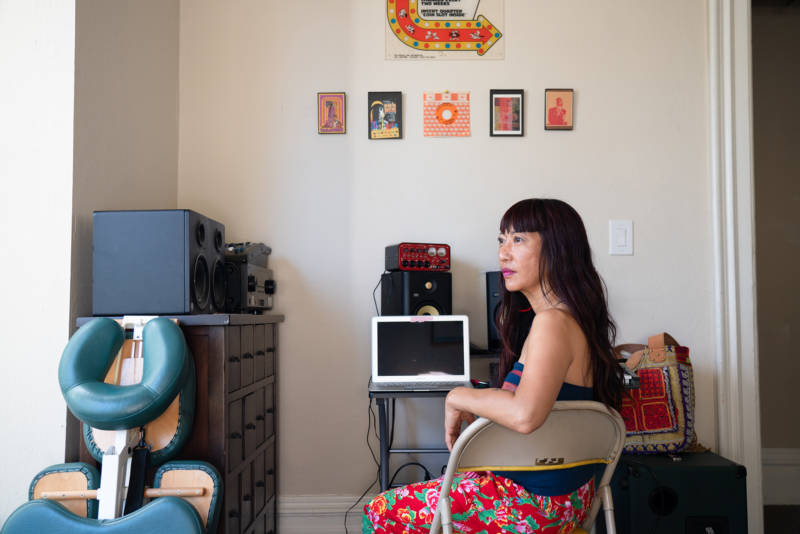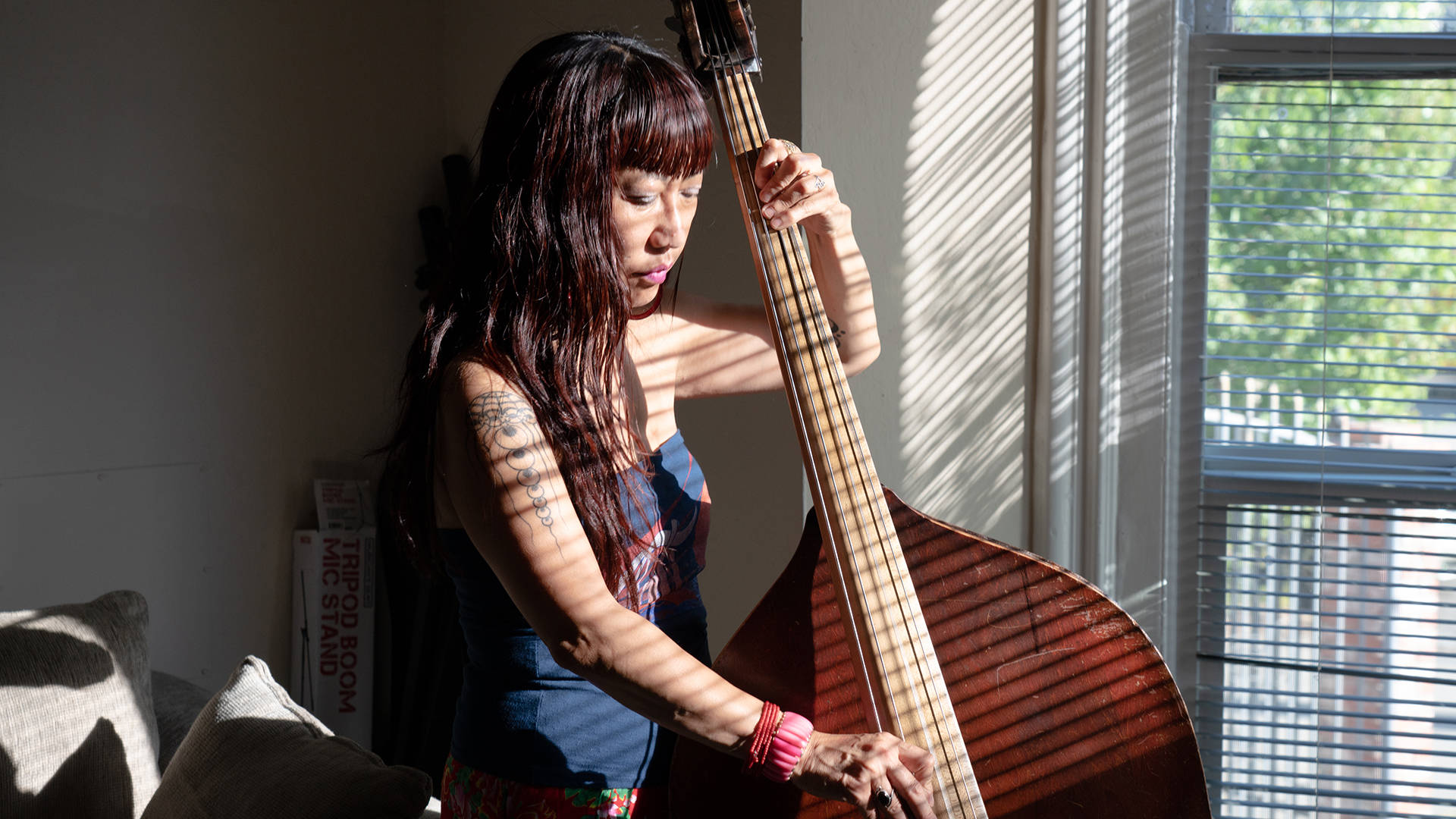Jazz bassist Caroline Chung has been gigging in the Bay Area since 1999, so she knows how to be resourceful. On a recent afternoon, I meet her poolside at an upscale apartment tower in Oakland’s Jack London neighborhood. She has the keys because she’s watching an old, fluffy toy dog whose owner is out of town—one of the many side hustles she’s taken on as an independent musician in a region with more billionaires per capita than anywhere else in the world.
A Bassist and Massage Therapist Relies on Her Hands to Survive the Bay Area Economy
We settle into a cushioned cabana among the building’s well-tanned, Botoxed and muscled residents. A group of dudes with six packs (both beer and abdominal) fire up a grill; a woman in a bikini lounges while watching Netflix on her phone. It’s Monday, but none of them seem to be in a rush.
These fancy digs aren’t the norm for Chung, but her house-sitting side jobs allow her to enjoy such occasional luxuries. Before we dip into the pool, she reflects on the self-care rituals that help her stay sane in the Bay Area’s high-pressure economic climate.
“Part of it is having that quiet, introspective, meditative time,” she says. “I spend a lot of time writing music, and I feel like it keeps me grounded.”

Chung lives not far from where we meet, in a three-bedroom West Oakland house she shares with two roommates. The other half of their duplex is the office of a social justice nonprofit, so there are no neighbors to bother when Chung has band practice there with her ensemble, Citizens Jazz.
“I got lucky with this place because the landlord is very reasonable, and he’s a jazz fan,” says Chung. Her third of the rent is just over $800, and because she can practice at home—even with a drum kit, which would be a no-go in an apartment building—she saves hundreds of dollars a month, not to mention time commuting since she doesn’t have to rent a separate practice space.
Chung has lived in the Bay Area for 20 years (with a brief stint in New York around 2008), and she’s weathered the jazz scene’s expansions and contractions, which usually go hand-in-hand with larger economic forces. With venues closing and changing management over the years, work hasn’t been quite as plentiful as it once was. “Even though my playing has gotten better, I feel like I have fewer regular gigs than I did,” she says.
Chung typically performs once or twice a week; she has a residency at the upscale North Beach cocktail bar Comstock Saloon, where she plays every other Wednesday. She also gets bookings for weddings and events through the app Thumbtack, a marketplace for freelancers of all kinds. Those jobs typically pay two to three times more than a restaurant or bar gig, Chung says.

A nimble player with varied tastes, Chung is just as likely to perform a tribute to bebop great Dizzy Gillespie or swing composer Billy Strayhorn as she is to lead her band in a bossa nova and Latin jazz set. She runs Citizens Jazz as a loose collective; the size of the ensemble depends on the client’s budget, which allows her to pay her bandmates the fairest possible wage.
Making sure everyone in her band is well compensated is front-of-mind for Chung, but her role as a bandleader also came out of necessity in what she describes as a male-dominated scene where women musicians are often taken less seriously, and hired less frequently. “Very early on, I learned to do my own thing and get my own gigs,” she says. “Most of my gigging is the gigs that I get, and I hire the musicians because otherwise I would never work.”
Chung estimates that about 45 percent of her $35,000 annual income comes from music. It used to be 100 percent, but she went to school to become licensed as a massage therapist in 2014 after losing several regular shows—including her Friday and Saturday nights at the now-shuttered Burritt Room, which were a crucial moneymaker. Several other gigs disappeared after bars changed management, and the new managers decided to replace Citizens Jazz with their friends’ bands, she says.
“I just got really fed up where I was ready to give up music, which is why I went into massage therapy school,” she says. “I’m glad I did that because I don’t have to stress out anymore.”
For her day job, Chung does massage 12 hours a week at Piedmont Spa and two hours a week at Kaiser’s KP Fit program, with her going rate at $40 to $60 an hour. (As an upright bassist and massage therapist, she’s developed what are likely some of the strongest hands in the Bay Area.) She says massage therapy brings in about 45 percent of her income, and the remaining 10 percent comes from odd jobs like pet sitting and house sitting.
Later that afternoon, Chung hosts musician friends in the Jack London building’s spacious lounge, and one of her friends cooks the group an aromatic Indian feast. “It’s nice, sometimes I forget that all I have to do is make the effort to gather people,” she says. “Sometimes I do spend too much time alone, and I know you need to get out, especially if you want to meet musicians who might hire you.”
Though Chung’s income is modest for this region (the median household income in Oakland is just over $63,000), she’s found ways to thrive. She rarely eats out, only splurging on organic, sustainable food occasionally. And she thrifts her clothes, like the stylish batik-print shift dress she’s wearing when we meet up. “I have more fun going thrift store shopping anyways,” she says.
And, a testament to her generous personality, she still finds time and money to help people without housing in her neighborhood, buying them food and making calls to help connect them to resources. She tells me about a gentleman she befriended recently who wants to get off the streets.
“Part of the time I feel like I’m running around acting like a social worker,” she says.

With no federal or state laws guaranteeing musicians a fair wage, Chung has faced challenges advocating for herself over the years. She tells me about a time a bar manager cancelled on her last minute—despite the fact that she invested time rehearsing, and turned down other opportunities to take that job. When Chung asked him to pay half of her rate for the last minute cancellation (a standard practice in many other industries that rely on contract workers, including journalism), the manager paid up but never booked her again.
“They were really bothered by that,” she sighs. “Even if you stand up for what you feel is fair, they will take that as a negative.”
Being a professional jazz musician takes years of training, and hours of weekly practice. Yet Chung says that many venues in the Bay Area pay only $20–$40 per musician for a three-hour gig, which factors out to less than minimum wage (she refuses to play unless everyone in her band is well compensated for their time). In 2011, Chung attempted to organize a musicians’ boycott of underpaying bars and clubs. Unfortunately, she realized that even if more experienced players held out, young, eager up-and-comers would gladly take their spot for next to nothing.
“I do think it’s important for musicians to not play gigs where they’re not paying you or treating you fairly,” she says. “It’s kind of the only way you can make a statement.”
Chung doesn’t pretend that being a musician in the Bay Area is easy. But through determination and a realist perspective, she’s making it work.
“My overall goal is to be the best musician I can be, and try to not focus on other people’s successes and comparisons because it’s so easy to get down,” she says. “Now that I’m older, I’ve learned to have a personal relationship with the music without letting anything else get in the way.”


